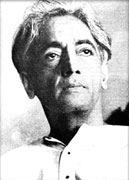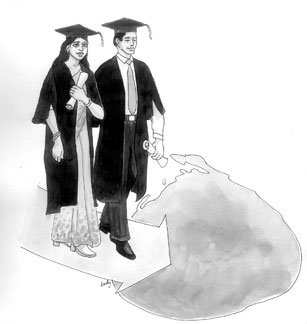Holistic approach to education
Sarath Lewke Bandara P C
|
 |
|
J
Krishnamurti
Born - May 11, 1895
Died - February 17, 1986
(aged 90)
Occupation - Public speaker, author, philosopher
Subject areas - Psychological revolution, nature of
the mind, meditation, human relationships and bringing about
positive change in society |
It is encouraging to see that there is evidence of at least an
incipient dialogue and concerning the prevailing system of education in
this country and various suggestions and proposals for its reforms
arising from many quarters.
It is traditional in our society for those who excelled in the
Advanced Level Examination out of the number who passed it to be brought
out into the limelight and accolades showered upon them and unwittingly
an equal number of children who ended up in total failure to be swept
under the carpet and left to fend for themselves.
The stark reality of this phenomenon which portends a danger to our
body politic has of recent times awakened the interest of not only the
powers that be but of these very failures who have decided to group
themselves together to drive home the poignant reality arising from this
great divide among the youth of this country.
Great spiritual teacher
There is little question, therefore, that the field of education is
currently in need of in-depth revision. Its importance and relevance for
the individual and society as a whole has been evident to both educators
and lately has been articulated by politicians’ even as cosmetic
proclamations. The urgency of the situation is beginning to generate a
great deal of reflection and discontent as well as a frantic search for
an alternative to the current system whose virtues and failings can be
readily recognised.
Despite the fact that in this country there is no dearth of renowned
educationalists and experts in the field and institutes for the study
and research in the field of education, only ad hoc fragmented and ill
advised solutions are suggested and experimented bringing in their wake
more chaos, confusion and travail. A holistic approach to the entire
question of the aims, objectives and end-result of education has been
totally ignored.
It is indeed a pity that the teachings of J Krishamurthi, the great
spiritual teacher of the last century, whose insights reflect a clear
contemporary statement of the fundamental human problem and in whose
life and work the concern with education occupied a very important
place, have eluded the attention of those concerned with education in
the country. From the very beginning Krishnamurthi’s general teaching
was directly linked with education.
Krishnamurthi’s teachings were aimed at creating a mind-set to bring
about a regeneration of humanity away from the decadent and destructive
pattern that evidenced the ending of a historical cycle. He therefore
gave the educator and the school a pride of place in society as being
responsible fundamentally in bringing about a new human being and a new
society.
The purpose of such a holistic education constituted three basic
aspects of educational activity, namely firstly to provide the knowledge
and skills necessary to function in society; secondly to discover and
cultivate specific hidden talents in the individual and thirdly to
awaken a deeper interest in and for the concern of the wholeness of
life.
Educational process
In the current state of education, most of the private and State
energies are poured in to the first two aspects namely those areas
having to do with knowledge, capacity and specialization. The third
aspect is generally ignored and left to the individuals, whereas it is
the most universal and should be at the heart of the educational process
as wholeness is the fundamental and unalienable intent of man.
 For wholeness to flourish it is essential to create an educational
atmosphere that is free from the destructive pattern of arbitrary
authority with its conditioning structures of reward and punishment. The
resulting effect of fear and hurt produces in the child harmful reflex
patterns of self-protective reaction. For wholeness to flourish it is essential to create an educational
atmosphere that is free from the destructive pattern of arbitrary
authority with its conditioning structures of reward and punishment. The
resulting effect of fear and hurt produces in the child harmful reflex
patterns of self-protective reaction.
The other pernicious aspect in modern education is comparison and
competition which have harmful effect on the young mind. As
Krishnamurthi so aptly put it, “Comparison really kills. It is
degrading. It prevents one’s outlook. All our education is based on it
and so is our culture. Comparison breeds competitiveness, ruthlessness
and ambition. To bring up children without comparison is true
education”.
Educational structures
This wholeness so expressed as the inward harmony between body, heart
and mind involves the qualities of sensitivity, affection and
intelligence. Be it relationship with nature and other human beings the
essence of right action is the underlying interconnectedness between us
and others. Love, affection and compassion are alien to modern
educational structures. This is inevitable and consistent with the
general concept of prevailing education as a means of imparting
knowledge and skills with a view to integration with the labour market
or the social structure. Intelligence is confined to levels of skills in
academic performance and emphasis laid on technical performance and
conformity to establish patterns resulting in the obliteration of the
human essence in education.
To those critical of this approach to education as impractical and
Utopian, it is important to appreciate that for human beings and more
particularly for children of tender age relationship is the most
important thing in life. To bring about individual fulfilment and common
good at the expense of relationship is a contradiction in terms. Further
one has to look around in our neighbourhood and in our own homes to see
how children of tender age have been dehumanised by the insane drive
towards the obsessive rat race towards ‘excellence’ at the expense of
the young mind being warped with hate, fear, envy, jealousy and
insecurity culminating in violence and blood shed in our campuses and
society at large.
Key insights
As Krishamurthi observed the problem of education is not with the
child but with the adult, namely educators and parents. If the parents
truly loved their children they will always find the right school for
their child. Krishamurthi because of the love and concern he had for the
young of this world created during his lifetime schools based on his key
insights on education bearing ample testimony to the fact that such
schools are possible and a practical reality and not an Utopian fiction.
These schools have been informed by J Krishamurthi’s teachings as
their essential purpose the cultivation of a whole human being, which is
really the cultivation of the four basic arts, namely the art of seeing,
the art of listening, the art of questioning and the art of learning,
all of which make up the great art of living. This education is centered
on observation and inquiry in a sense of pliable attention to ever
changing inward and outward aspects of existence.
|



